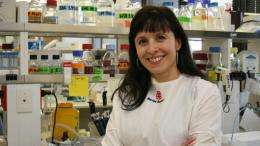Making vaccines more effective

(Medical Xpress)—Scientists have discovered an important mechanism in which a synthetic DNA targets the immune system that could significantly improve the effectiveness of future vaccines.
This cutting edge research was published today in the Proceedings of the National Academy of Sciences (PNAS) journal.
Burnet Institute Centre for Immunology Laboratory Head, Dr Irina Caminschi, has identified for the first time a new receptor (DEC-205) that binds to the synthetic DNA (known as CpG),
"CpG is very immune-stimulatory, it makes the immune system more reactive, which is why it is used in vaccines. It is currently in clinical trials for cancer and malaria vaccines," Dr Caminschi said.
"While testing it for various immune responses, we discovered a mechanism that elicits that very strong reaction."
Though researchers have used CpG to enhance immune responses, it was unknown which receptor the immune cells used to actually grab the DNA and internalise it for recognition.
"Essentially by understanding how the immune system recognises this foreign, synthetic DNA and the rules that govern this recognition, we can exploit it so that when it gets used in a vaccine it works better," Dr Caminschi said.














